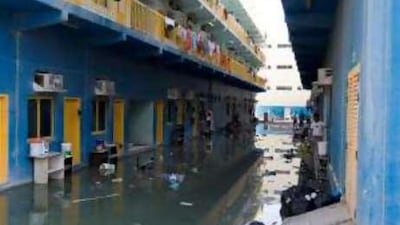DUBAI // Workers living in labour accommodation areas of Dubai yesterday said that overflowing septic tanks and sewage water is leaving them unwell and unable to work. The complaint comes less than a month after Dubai Municipality proposed to increase fines by tenfold on companies who do not clear their septic tanks and cause sewage spills and an unhealthy environment. The National visited a labour camp in Al Qouz yesterday where more than 600 workers from various companies were living. Stagnant sewage water has flooded the complex causing an unbearable stench and unhealthy conditions.
"The sewage water is overflowing from manholes because the tanks have not been emptied. These are inhuman conditions to live in," said a member of staff at one of the companies. He added that the company had to take at least two workers to the hospital yesterday morning as they suffered from fever and malarial symptoms. "Many of our staff have complained of uneasiness and have fallen unwell," said the employee. He said the conditions worsened after the recent rains in Dubai that caused flooding in several areas.
Similar waste water pools were noticed in several camps in the area. The collected water was also seen flowing into storm water drainage systems in the area. "Companies keep promising that the tanks would be cleared. However, no tankers are seen here," said a labourer. The complaints came from labour accommodation areas such as Al Qouz, Sonapur, Jebel Ali and others. Drainage infrastructure in Dubai is straining to cope with the boom in population. Earlier this year it was discovered that waste lorries were dumping their loads illegally into storm drains that emptied into some of the city's beaches rather than face long queues at official disposal sites. Dubai Offshore Sailing Club was obliged to close its private beach in August and has banned sailing in its private harbour since then and a nearby public beach has also been closed.
In an attempt to pressure companies to follow regulations, the municipality had proposed an increase in fines from the existing Dh1,000 to Dh10,000. Salem Mesmar, the Assistant Director General for Health, Safety & Environment Control at Dubai Municipality said yesterday that tough action would continue against such offenders but the problem could not be solved overnight. "As a control authority, starting this week, we are slapping a Dh10,000 fine on companies who are violating the regulations. It is better for these companies to pay the sewage water tankers than to pay us. However, if these companies are still not complying, then the fines would be doubled," said Mr Mesmar.
He added that municipality inspectors had been asked to concentrate on this issue and conduct regular and repeated checks. "I cannot say that the problem would be immediately solved. However, these steps would reduce the number of cases," he added. When questioned about the workers falling ill, he said: "The health of the workers is the responsibility of the company for whom they work. They have to take the necessary measures."
The Al Qouz area is still waiting for a drainage network for its waste water. Mr Mesmar said the drainage network at the other labour accommodation area, Sonapur, is ready and connections have already started. Mr Mesmar also said a temporary sewage treatment lagoon would be ready by the end of the year, which would reduce the pressure on Dubai's sole treatment plant at Al Aweer. The lagoon is located on the outskirts of Dubai and can accommodate 500 tankers, which would help reduce the long queues at Al Aweer treatment plant.
The long queues at the sewage treatment plant resulted in frustrated sewage tank drivers dumping the waste in open areas and storm water drains. Another sewage treatment plant at Jebel Ali is expected to be ready next year. pmenon@thenational.ae

